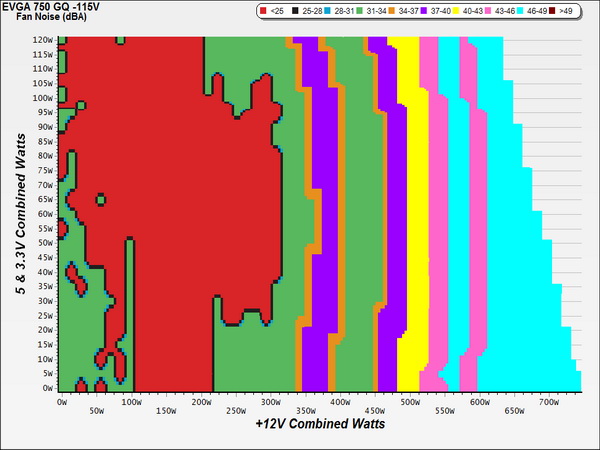EVGA GQ Series 750W PSU Review
EVGA teamed up with FSP once again to produce the new GQ line, which is one step below the highly popular G2 series. The four GQ PSUs feature 80 Plus Gold efficiency and semi-modular cabling, promising quiet operation.
Why you can trust Tom's Hardware
Efficiency, Temperature And Noise
Efficiency
Our efficiency testing procedure is detailed here.
Using the results from the previous page, we plotted a chart showing the 750 GQ's efficiency at low loads, and loads from 10 to 110 percent of the PSU's maximum-rated capacity.
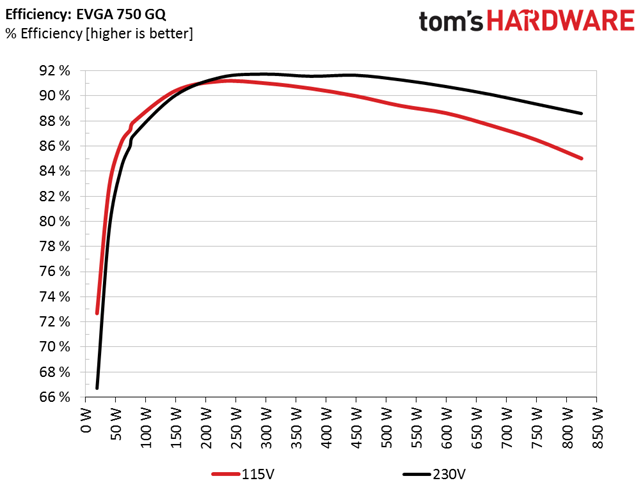
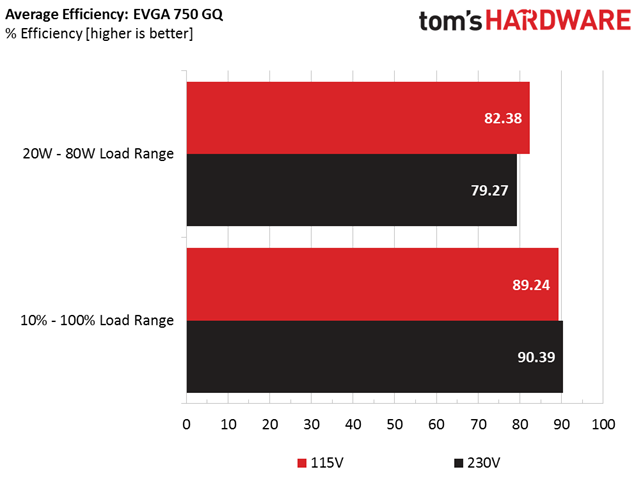
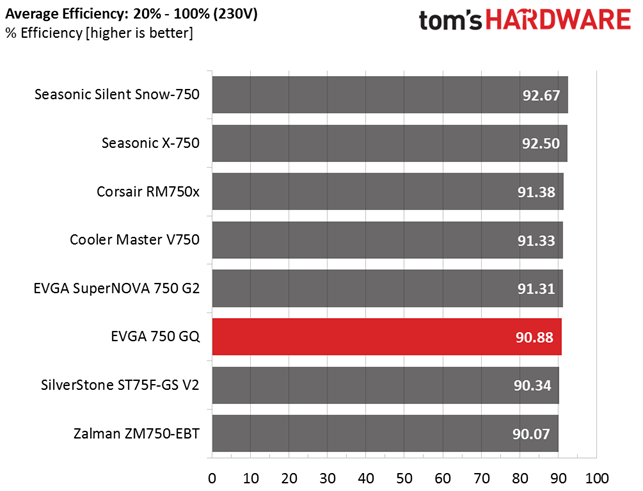
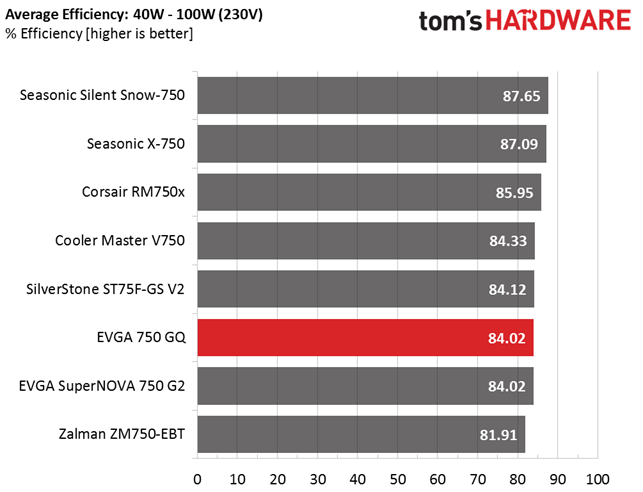
Under light loads, the 750 GQ manages to match the higher-priced G2 model's performance; under normal loads, it trails a bit. Overall though, the GQ achieves good efficiency, especially if we take into account its affordable price.
Efficiency At Low Loads
In the following tests, we measure the efficiency of EVGA's 750 GQ at loads significantly lower than 10 percent of its maximum capacity (the lowest load the 80 Plus standard measures). The loads we dialed were 20, 40, 60 and 80W. This is important for representing when a PC is idle, with power-saving features turned on.
| Test # | 12V | 5V | 3.3V | 5VSB | DC/AC (Watts) | Efficiency | Fan Speed (RPM) | Fan Noise (dB[A]) | PF/AC Volts |
|---|---|---|---|---|---|---|---|---|---|
| 1 | 1.202A | 0.501A | 0.482A | 0.195A | 19.66 | 72.68% | 0 | 0 dB(A) | 0.889 |
| 12.126V | 4.983V | 3.304V | 5.099V | 27.05 | 115.0V | ||||
| 2 | 2.435A | 0.999A | 0.999A | 0.391A | 39.78 | 82.70% | 0 | 0 dB(A) | 0.925 |
| 12.124V | 4.977V | 3.299V | 5.093V | 48.10 | 115.0V | ||||
| 3 | 3.664A | 1.496A | 1.515A | 5.089A | 59.81 | 86.26% | 0 | 0 dB(A) | 0.945 |
| 12.117V | 4.973V | 3.294V | 5.089V | 69.34 | 115.0V | ||||
| 4 | 4.891A | 2.013A | 2.003A | 0.785A | 79.82 | 87.90% | 0 | 0 dB(A) | 0.952 |
| 12.111V | 4.970V | 3.291V | 5.084V | 90.81 | 115.0V |
Under light loads, the PSU's fan doesn't spin and efficiency is pretty high (even down to 20W). Apparently the ACRF topology in this unit has low power losses, allowing for increased efficiency without the use of exotic and expensive parts.
5VSB Efficiency
The ATX specification states that 5VSB standby supply efficiency should be as high as possible, recommending 50 percent or higher efficiency with 100mA of load, 60 percent or higher with 250mA of load and 70 percent or higher with 1A or more of load.
We will take four measurements: one each at 100, 250 and 1000mA, and one with the full load the 5VSB rail can handle.
Get Tom's Hardware's best news and in-depth reviews, straight to your inbox.
| Test # | 5VSB | DC/AC (Watts) | Efficiency | PF/AC Volts |
|---|---|---|---|---|
| 1 | 0.102A | 0.52 | 68.42% | 0.129 |
| 5.107V | 0.76 | 115.1V | ||
| 2 | 0.252A | 1.29 | 77.25% | 0.230 |
| 5.105V | 1.67 | 115.1V | ||
| 3 | 1.002A | 5.10 | 79.32% | 0.370 |
| 5.090V | 6.43 | 115.1V | ||
| 4 | 3.002A | 15.17 | 79.72% | 0.439 |
| 5.053V | 19.03 | 115.1V |
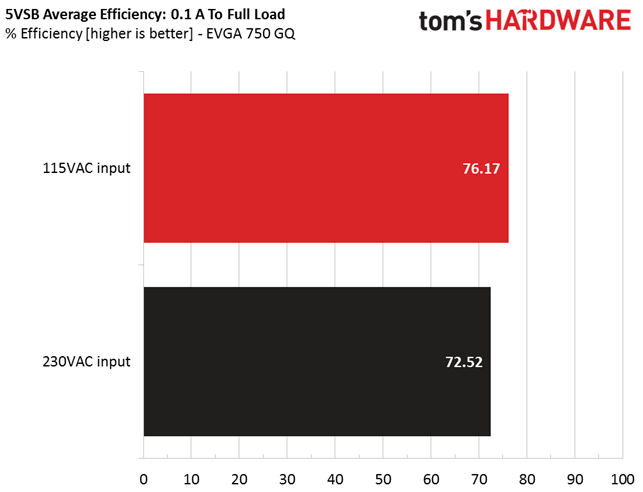
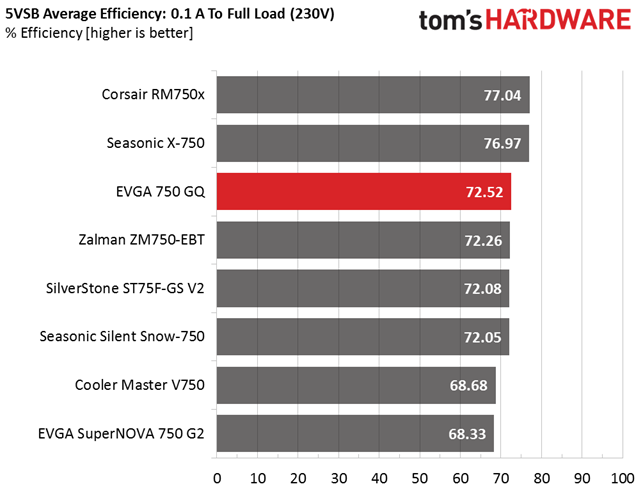
The 5VSB rail registers high enough efficiency levels, although it doesn't manage to pass the 80 percent mark in any test. It does get close under full load, however. In general, the performance of this rail is pretty good since it combines tight load regulation with increased efficiency.
Power Consumption In Idle And Standby
| Mode | 12V | 5V | 3.3V | 5VSB | Watts | PF/AC Volts |
|---|---|---|---|---|---|---|
| Idle | 12.148V | 4.982V | 3.304V | 5.112V | 7.41 | 0.708 |
| 115.1V | ||||||
| Standby | 0.15 | 0.028 | ||||
| 115.1V |
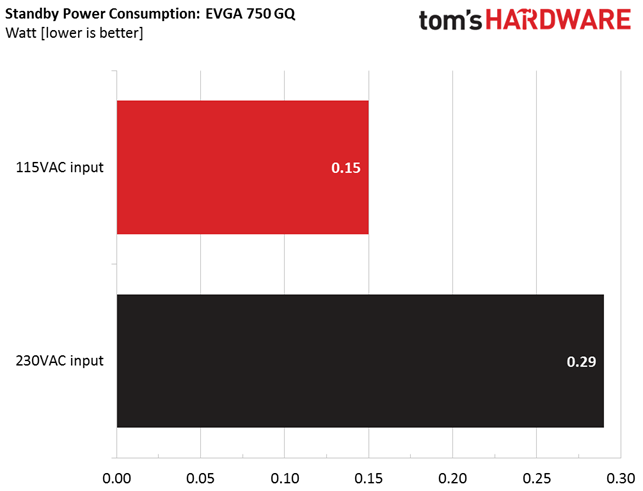
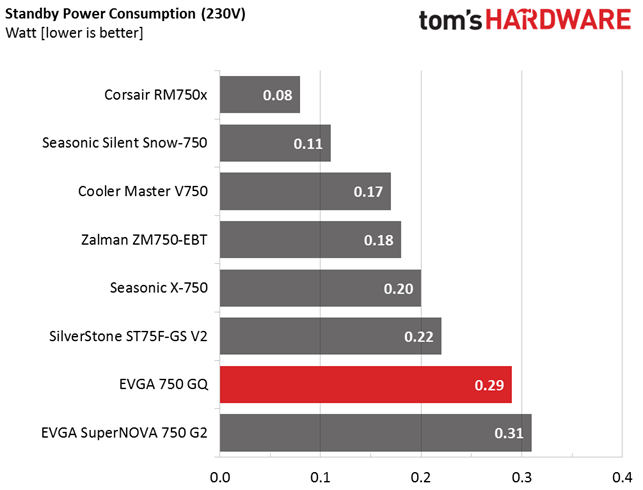
In the table above, you'll find the power consumption and voltage values of all rails (except -12V) when the PSU is idle (powered on, but without any load on its rails), and the power consumption when the PSU is in standby mode (without any load, at 5VSB).
Vampire power isn't as low as in other PSUs we have tested. Still, EVGA's 750 GQ passes the ErP Lot 6 2013 requirements with flying colors, with both 115V and 230V input.
Fan RPM, Delta Temperature And Output Noise
Our mixed noise testing is described in detail here.
The first chart below illustrates the cooling fan's speed in RPM, and the delta between input and output temperature. The results were obtained at 34 °C (93.2 °F) to 47 °C (116.6 °F) ambient temperature.
The next chart shows the cooling fan's speed (again, in RPM) and output noise. We measured acoustics from one meter away, inside a small, custom-made anechoic chamber with internals completely covered in sound-proofing material (be quiet! Noise Absorber kit). Background noise inside the chamber was below 18 dB(A) during testing, and the results were obtained with the PSU operating at 34 °C (93.2 °F) to 47 °C (116.6 °F) ambient temperature.
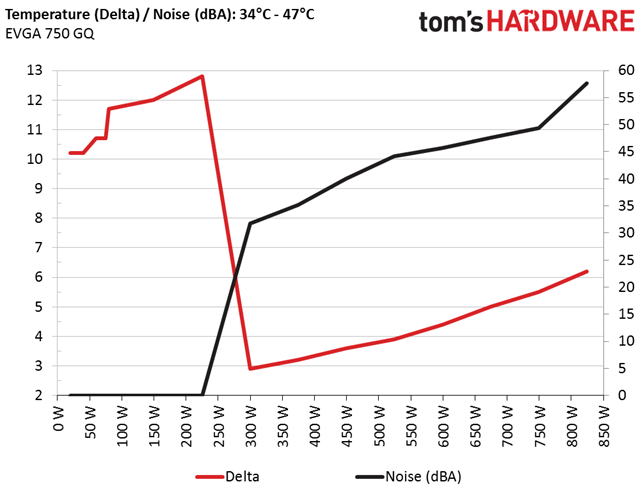
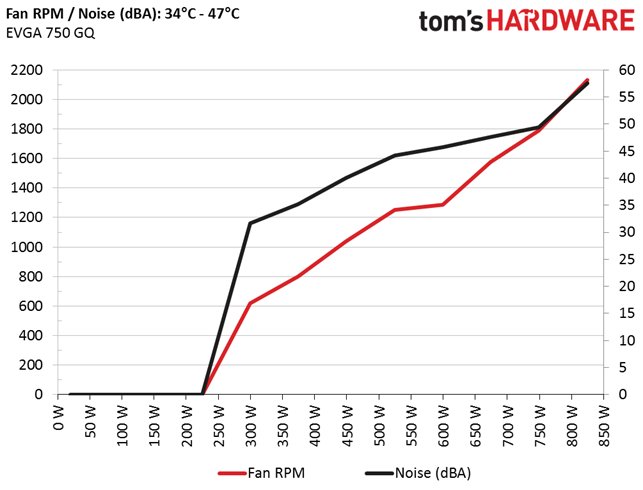
The following graph illustrates the fan's output noise over the entire operating range of the PSU. The same conditions of the above graph apply to our measurements, though the ambient temperature was between at 28 °C (82.4 °F) to 30 °C (86 °F).
The PSU started our tests with its fan spinning slowly, and not in passive mode as it should have been. More than likely, this was because we were pushing the minor rails right off the bat. Passive mode was triggered afterwards, but not for long. Up to around 350W load, the fan made a bit of noise. For a short time afterward, its speed increased, only to drop again between 400-450W. Beyond 500W, the noise levels increased quickly, and under 600W or more, the noise was very loud.
Current page: Efficiency, Temperature And Noise
Prev Page Load Regulation, Hold-Up Time And Inrush Current Next Page Cross-Load Tests And Infrared Images
Aris Mpitziopoulos is a contributing editor at Tom's Hardware, covering PSUs.
-
10tacle Huh. Johnny Guru gave two variants of this PSU series recommended ratings back in Nov. & Dec (650, 850). I saw a 650W on sale at NewEgg last December for $50(US) after rebate and almost recommended it to a friend, but I didn't as I hadn't seen a JohnnyGuru review on the GQ series yet (they gave it a 9.4). They also gave the 850W version a 9.2 rating back in November.Reply
Not sure what happened with this 750W example, but it sounds more like what one would expect with a Corsair CX750 example. Definitely not the same results that Johnny Guru got with two different GQ variants. -
Aris_Mp The lower capacity GQ models use a different platform from the higher capacity ones (850W and more).Reply
The design of the 650 and 750 GQ models doesn't allow for better performance, especially in ripple performance. -
dstarr3 Eh, I'd stick with the G2 series. That's a lot more quality for only a small price premium. And really, the PSU is probably the worst place to cut costs in a system build.Reply -
basroil Oh god, another PoS EVGA unit that shares a similar name to the spectacular G2... I can see a flood of "my graphics card has coil whine", "my computer constantly crashes", and "my headphones have static/popping (only when playing games)" posts in the forum soon...Reply -
joz ReplyEh, I'd stick with the G2 series. That's a lot more quality for only a small price premium. And really, the PSU is probably the worst place to cut costs in a system build.
Agreed. G2 550 and 650's are great. And the P2 750+ if you need that sort of power are great too. But these...."craptacularripplefail," units EVGA is tossing out is really hurting their image. I understand market catering and such, but they need to rethink their strategy. They aren't going to win any price/perf races while Corsair can continue to throw their shitty cx units out the window to customers. And EVGA I hold to higher standards then Corsair, so its kind of a shame to see the performance of these lower quality power supplies. -
Dark Lord of Tech I would take the EVGA G2 , P2 , T2 over any other POWER SUPPLIES including Seasonic.Reply -
jonnyguru ReplyAgreed. G2 550 and 650's are great. And the P2 750+ if you need that sort of power are great too. But these...."craptacularripplefail," units EVGA is tossing out is really hurting their image. I understand market catering and such, but they need to rethink their strategy. They aren't going to win any price/perf races while Corsair can continue to throw their shitty cx units out the window to customers. And EVGA I hold to higher standards then Corsair, so its kind of a shame to see the performance of these lower quality power supplies.
Unfortunately, you can't be too profitable selling only niche higher end product. At some point, if you want the board of directors to let you continue putting out power supplies, you have to put something out that can do volume. The B2 Series, The GQ Series, etc. Don't like them? Don't buy them. Is it hurting their reputation? No. Not as long as higher end units like the G2, P2, etc. continue to be solid. But if they start to slip for whatever reason, then you can say their reputation is in jeoprady. Seriously. Hardly anybody judges the Corvette because of the Chevy Spark (well... maybe some Ford fanboys, but still). -
Dark Lord of Tech I like the GQ's and recommend them , also love the Corsair RMx series and recommend those too.Reply -
PureBlackFire ReplyHuh. Johnny Guru gave two variants of this PSU series recommended ratings back in Nov. & Dec (650, 850). I saw a 650W on sale at NewEgg last December for $50(US) after rebate and almost recommended it to a friend, but I didn't as I hadn't seen a JohnnyGuru review on the GQ series yet (they gave it a 9.4). They also gave the 850W version a 9.2 rating back in November.
Not sure what happened with this 750W example, but it sounds more like what one would expect with a Corsair CX750 example. Definitely not the same results that Johnny Guru got with two different GQ variants.
well, this is hardly the first time an FSP platform performed reasonably well at 650 watts and sucked at 750. sure it won't be the last either. as for the 850, like Aris said, based on a different (better) design.
-
10tacle Reply17373323 said:well, this is hardly the first time an FSP platform performed reasonably well at 650 watts and sucked at 750. sure it won't be the last either. as for the 850, like Aris said, based on a different (better) design.
That's just not right. A certain series should be of the same quality across the series offerings. There's a reason people shop for different series for their needs (budget vs. quality, etc.). Hell it's complicated enough already just trying to keep up with each OEM series line offerings and their quality tiers. I mean we all know the general quality difference between Corsair's CX line and EVGA's G2 line.
